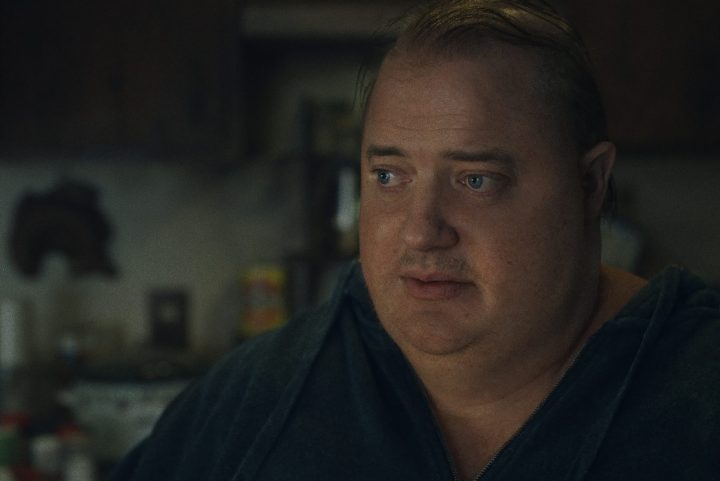Hollywood loves a good comeback story, especially when that actor is as kind and graceful as Brendan Fraser. Thirty years ago, Fraser starred in Encino Man and School Ties, establishing himself as a leading man that would eventually headline blockbusters, like George of the Jungle and The Mummy, for the next 15 years. Although Fraser’s public presence diminished, his talent never disappeared as the world rediscovers his star power again in The Whale.
Directed by Darren Aronofsky, Fraser stars as Charlie, a 600-pound recluse watching his life slip away in the confines of his two-bedroom apartment. As his health deteriorates, Charlie attempts to reconnect with his teenage daughter, Ellie (Sadie Sink), who hates him with every fiber of her being. Written by Samuel D. Hunter, who also penned the play that inspired the film, The Whale is a tragic depiction of grief as a man seeks to reconcile with his past. It’s an incredible performance from Fraser, whose resurgence could end with the phrase, “And the Oscar goes to …”
In an interview with Digital Trends, Fraser and Hunter explain the importance of telling an authentic story about addiction and disease. Plus, Fraser shares what message he hopes the audience will take away from the film.
Note: This interview has been edited for length and clarity.
Digital Trends: Brendan, you mentioned you did not know much about the film or the play going into your initial meeting with Darren. I believe you didn’t even have a script to read. When you started to learn more about the project in that initial meeting, what caught your eye?
Brendan Fraser: That we would be creating this character in a way that hasn’t been done in films before. To specify, he’s a man whose body is hundreds and hundreds of pounds. It would require, whether it’s me or any other actor, to wear a costume, makeup, and apparatus applications to create that person authentically.
I watched a lot of movies where weight gain suits were used, and this is not one of those. This one respects gravity and physics and was created through a digital process that you could print the molds from so there was absolute consistency. There was very little digital treatment done to create Charlie.

That was a character about a physical challenge. Darren didn’t know if he was going to make the movie or not just based on those elements because if you get it wrong, we don’t have a movie. We don’t have a movie if the first makeup test wasn’t right in that frozen meeting in the Protozoa offices when we first put everything on.
If it was wrong, you can’t do it, but that wasn’t the case. And once we got that down, then it’s just a matter of attending to the story points, rehearsing as we did for three weeks, and doing our honest best to approach the piece with as much authenticity and vulnerability as we could muster.
Sam, this is a deeply personal story to you. I know you’re revisiting some dark days in your life. When you were approached to write the screenplay, was there ever a point where you thought to yourself, “I can’t go through with this again. I don’t want to relive these moments?”
Samuel D. Hunter: I think writing the play and then having the play produced was incredibly cathartic for me. Not to be too neat about it, but like I lost a bunch of weight right after the play got produced in New York. I think I had seen it done enough and worked on it enough and worked with enough collaborators that I could sort of look at it, I don’t want to say objectively because it’s always going to feel vulnerable.
It’s always going to feel very, very close to me, but I was nervous. Handing it over to someone on film is a very different process. You know, plays are very ephemeral. It’s one of the things I love about them is because, you know, you see them as they’re happening.
Fraser: It lives.
Hunter: [Laughs] Yeah, but film is etched in marble, you know? So I knew that we had to get it right. Darren knew we had to get it right, and it took a decade to find that guy, and boy, did we find that guy. Boy, did we find that guy. Thank God.

Brendan, it’s no secret that this performance is going to be a major contender this awards season, and I admire that you’re openly talking about how this is your shot, and you owe it to yourself, the film, and the fans to really go for it. I just wanted to know why you feel so strongly about it that way, to really go for it.
Fraser: This is a story about a man who could otherwise be so easily dismissed, and sadly is so often. We, as a society, have a long way to go, and I think this is a good start toward ameliorating the way that we speak of [and] regard those who live with obesity, which is a disease and often the cause being an addiction. I learned that from having worked at the Obesity Action Coalition and the counsel that they gave me, and I earned their trust and have borne a responsibility to treat the subject with dignity and respect.
I could do that because of the strength of the filmmaking in this story. Insofar as my fondest hope, I think we can do better. Anyone who comes into this movie, by the story’s end, I’m pretty certain they’re going to rethink or reorient the beliefs or prejudices that they may have upheld before they walked into this film. The fondest hope that we have is to possibly change some hearts and minds.
Well, I think you did just that.
Fraser: I’ve got to do what I can do to support that.
The Whale opens in theaters on December 9.



